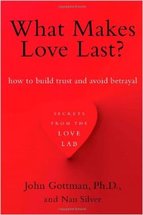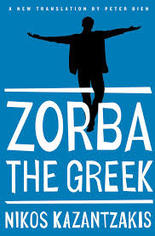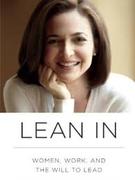 I read John Gottman's What Makes Love Last because I really enjoyed his famous Seven Principles for Making Marriage Work. I didn't find What Makes Love Last to be as useful as its focus on trust and trust issues seemed kind of out of place or random and disconnected logically from the very general idea of making love last ([mis]trust seems like only one of the ways love can fail). I didn't end up getting much practical value from the book, though the discussion of the Zeigarnik Effect was interesting. Intro Betrayal cause of love failing Trust is antidote 1 assessing your trust level Having each other's back Trying to help your partner get value 2 the 3 boxes Nice box: repair attempts Neutral box: happiest couples spend more time in neutral during disagreements Nasty box: flooding Sliding door moments: can turn toward partner at bids or away Zeigarnik effect: we have better recall for issues that are unfinished or unresolved than those that are finished or closed Negative sentiment override: viewing positive or neutral things with suspicion Positive sentiment override: giving benefit of doubt Gentle start: opposite of criticism (words like always and never) Accept responsibility for some of the problem Negative comparisons to others bad Positive comparisons create us vs world attitude Describe feelings Ask open ended questions Reflect back partners feelings Deepening statements Express compassion or empathy Don't offer opinions or problem solving Understanding must precede advice Be an ally more than problem solver Express needs in positive What else are you feeling Enduring vulnerabilities State of the union meetings Transform criticism into a wish
0 Comments
 So many people over the years have recommended I read Zorba the Greek, and I finally did this past month. It was a bit slow to get started, but when it did, boy was I hooked. Such heart and such poetry in a novel. I distinctly remember the lump in my throat and the strange liquid in eyes as I reached the end of the story. This book is an inspirational tale of loving life and women and living for the day. it's about finding meaning in people and the world around you, not in books or writing or pursuits which are purely intellectual. Yes, some of the literal messages about women may seem shocking/outdated: ideas like women are "sensitive, delicate creatures" who get more pleasure from giving pleasure and are easily made to feel embarrassed/delicate, the importance of being careful with them, sometimes providing them with a firm man's touch and confidence so they feel secure. But I think these all contain some grain of truth that doesn't change with time, and the core feeling is one of love and admiration; women are the only thing that can tame and control Zorba's wild spirit. The book is also an irreverent loud voice calling for loving each other and adventure in life rather than externally imposed structure, constraints, or religion. I think Penn Jillette would like it a lot. Below are some of my takeaways/main ideas.
 My wife and I went on a few long road trips recently, and we passed the time in the car listening together to the audio version of Lean In: Women, Work, and the Will to Lead by Sheryl Sandberg. The book ended up sparking a number of deep conversations and questions, and Suzanne even took notes! Through the process, I learned a lot about my wife, the perspective of professional women, and what implicit biases I personally have. I liked how Sheryl was very realistic and honest about her own struggles and the (sometimes blatant) discrimination she faced and which others routinely face. I liked how she gave concrete examples/scripts and shared a lot of meaningful personal details. I learned to appreciate much more how hard my wife works to achieve her goals and gain respect in ways that men receive a lot more by default in professional settings. I understood much more deeply the difficulty of balancing work and family life for a woman, and I really liked Sheryl's tips for professional couples. I saw my wife learning a lot from Sheryl's example and feeling like she's not alone in many of the feelings she has, like "imposter syndrome" (which I share too) and struggling against the default stance of not leaning in when there are risks. I learned some new ideas and models for how a couple can raise a family while also pursuing meaningful goals as independent adults. I also recognized better the role I can play in supporting her and pushing her to go after her dreams and believe in herself. Below were our biggest takeaways from the book. I feel lucky to have Suzanne in my life and to have been able to share this experience with her, learning about each other and the world around us.
|
Archives
June 2024
Categories
All
Subscribe |
 RSS Feed
RSS Feed
